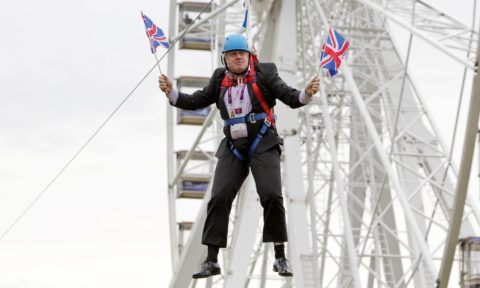In Quillette, John Lloyd considers the parts of Boris Johnson’s personality that allowed him to achieve the premiership but not to retain it:
The respectable consensus on Boris Johnson’s resignation is that the Lord of Misrule was an opportunist who rose to power amid the mayhem of Brexit that he’d helped to create, but that his fecklessness finally caught up with him. There’s something in that, but more in what’s not. Although his critics will refuse to admit it, what’s mostly missing is the laughter, which is now a more important factor in British public life than before.
Much of public and media life in the UK — and it isn’t unique in this — is a search for laugh lines, and Johnson — instinctively but also with calculation — played heartily into this. He always had. In a largely affectionate biography, Andrew Gimson, Johnson’s former colleague at the Spectator and the Daily Telegraph, writes that, “To make people enjoy being led by him was an aspect of leadership which Boris mastered at a very young age. He made people helpless with laughter, and so great was their enjoyment that they scarcely cared what he did with their support, as long as he kept on amusing them.”
With the laughter came Johnson’s inchoate libertarianism — a strong aversion to condemning activities in which others like to indulge, especially those in which he likes to indulge himself, such as adultery. He is fond of telling the story of when Churchill, Johnson’s lodestar as a public figure, was taken aside during his second administration (1951–55) by his chief whip and told that a cabinet minister had been discovered having sex with a guardsman in Hyde Park at 3am on a freezing morning in February. The press had found out, which the whip advised, meant the minister would have to resign. “Caught with a guardsman?” Churchill asked. “Yes Prime Minister.” “In Hyde Park?” “Yes Prime Minister.” “On a park bench?” “That’s right, Prime Minister.” “At three o’clock in the morning?” “That’s correct, Prime Minister.” “In this weather! Good God man, it makes you proud to be British!”
To Johnson, this is evidence of Churchill’s goodhearted tolerance and defiance of narrow prejudice (this was a time when homosexual acts were quite severely punished), which are matched only by his own in generosity and wit. To be generous and broadminded in his speech (he is said to be quite mean with his money) is attractive to the many sinners among us. We see in the Prime Minister a person with the moral outlook of Casanova and yet (or, and so) finds attractive women willing to dally with him — a cheering thought. As one of these, Allegra Mostyn-Owen, who became his first wife, later admitted, “at least he made me laugh.”
[…]
Accustomed to lying to wriggle out of embarrassments like the discovery of an adultery, he continued to mislead when he joined aides for impromptu parties at No. 10, when the strictest lockdowns and prohibitions on the public were in force. How could a man of such intelligence fail to realise that his bluster would unravel almost as soon as they were uttered? He had, it seemed, an inbuilt arrogance — a conviction that he was able to avoid consequences that brought others down, but which only made him stronger.
In the end, he ran out of that road. Ironically, what finished him was denying that he knew that a government whip, Chris Pincher, had a history of groping other men. Johnson refused to take the scandal seriously enough to fire Pincher, as his senior colleagues pressed him to do — an echo of the Churchill joke he liked to tell, and a reaction which accorded with his libertarian instincts. However, his colleagues finally wearied of delivering statements to the media that made them look ridiculous within days or even hours. It was the last straw.
When Lord Dannatt, a former head of the British Army, was confronted with the (admittedly faint) possibility that Johnson would be considered for the post of NATO Secretary General, he was quoted as saying: “There is no doubt that [Johnson] has done a lot of good, and our full support for Ukraine is just fantastic. But I am afraid that these are personal things, a lack of integrity, a lack of trust. Frankly, we do not want to put Boris Johnson on the international stage for further ridicule. He is a disgrace to the nation.”




